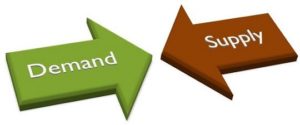According to recent reports private firms in Kenya increased the June pay for their workers, making it the highest rate in 21 months. The move is being seen as an attempt to encourage more productivity and also an added indicator that Kenya has begun the process of recovering from the negative impacts that the still ongoing Coronavirus pandemic had on its economy.

The Purchasing Managers Index (PMI) for Stanbic Bank Kenya which weighs the month by month changes in the activity output of the private sector along with employment and new orders, revealed that the pay growth for the month of June 2021 was the highest it has been since October of 2019.
Corporate heads in Kenya have reportedly been under pressure to meet the varying staffing needs present across board. Said corporate heads have seen the Coronavirus pandemic began, opted for the option of carrying out salary reductions for the most part as opposed to the more drastic decision of layoffs, in anticipation of a likely increase in demand over the next couple of months.
Interestingly the increase in pay occurred in a month when companies had slowed down on the pace with which the took in new hires when compared with May of 2021. Companies chose to place more emphasis on efficiency in the production of goods and services instead.
The Coronavirus pandemic led to the economic activity in Kenya shrinking to 5.5 percent during the height of trade shutdowns and travel restrictions in the period of April 2020 to June 2020. The drop however, slowed down to 1.1 percent by the July 2020 to September 2020 period when the Coronavirus pandemic lockdown measures, began to ease up.
The 2020 period in review also constituted a severe increase in pay reductions and layoffs as numerous establishments battled with the economic strains brought on by the pandemic.
Analysts at Stanbic Bank and the United Kingdom (UK) researcher; IHS Markit stated in the Purchasing Managers Index (PMI) report for June 2020 that, “Whilst only marginal, the pace of increase quickened slightly to the most marked since October 2019. Salary increases were mainly linked to efforts to boost productivity.”

In June of 2021 the Purchasing Managers Index (PMI) index experienced a drop to 51 from the 52.5 that was the case in May 2021. This reveals that although the conditions needed for business in Kenya were still quite positive, they were however not as good as was the case in May of 2021.
Any Purchasing Managers Index (PMI) reading that is higher than 50 points is indicative of an improvement in business conditions when compared to the month prior. Purchasing Managers Index (PMI) readings below 50 points signify that the business conditions have deteriorated.
Of the four hundred (400) corporate managers used in the poll for the survey, eighteen (18) percent of them confirmed an increase in demand, while sixteen (16) percent of them experienced a drop in orders due to a corresponding drop in the spending power of their customers. The four hundred (400) corporate managers used for the survey, were mainly from construction and services, manufacturing, and agriculture.
Kuria Kamau who is a fixed income and currency strategist at Stanbic Bank stated in the Purchasing Managers Index (PMI) report that, “The pace of the recovery slowed in June following the strong improvement witnessed in May when some of the stringent public health restrictions were lifted.”
Kuria Kamau added that, “Both domestic and export demand increased on account of higher customer numbers and increased cash circulation, but the increase was at a slower rate than in May.”
The amount of outstanding orders in addition to those coming from the export market, increased for the first time in four (4) months partly as a result of the fact that companies were not able to employ enough staff to adequately cater to the increased demand for goods.

The increase in demand from Europe was due in part to the recommencement of passenger flights between Nairobi and London after a three (3) month halt. Belly cargo contributed to a total of forty (40) percent of the total freight.
Businesses have however experienced and increase in input costs for the second month in a row. The increase is being attributed to the increase in the costs of raw materials, as well as the increase in fuel costs.
The businesses in response and in a bid to “sustain profit margins”, decided to increase their selling charges to consumers of goods and services even with the input cost inflation remaining stable.
A number of corporate managers in Kenya made it known that the outlook for business activities including a revival of expansion plans over the next twelve (12) months, got worse in June of 2021 due to the implementation of new restrictions in the thirteen (13) counties in the Lake Basin region as a way to effectively tackle the Coronavirus pandemic which so far continues to evolve.
Mr. Kuria Kamau stated that, “The surveyed firms’ outlook for the economy over the next year worsened after more stringent public health restrictions were imposed on 13 counties.”
How informative was this article? Are there any other news topics, categories, or How To topics, that you would like us to write on? Feel free to reach out to Mpesa Pay in the comment section.


